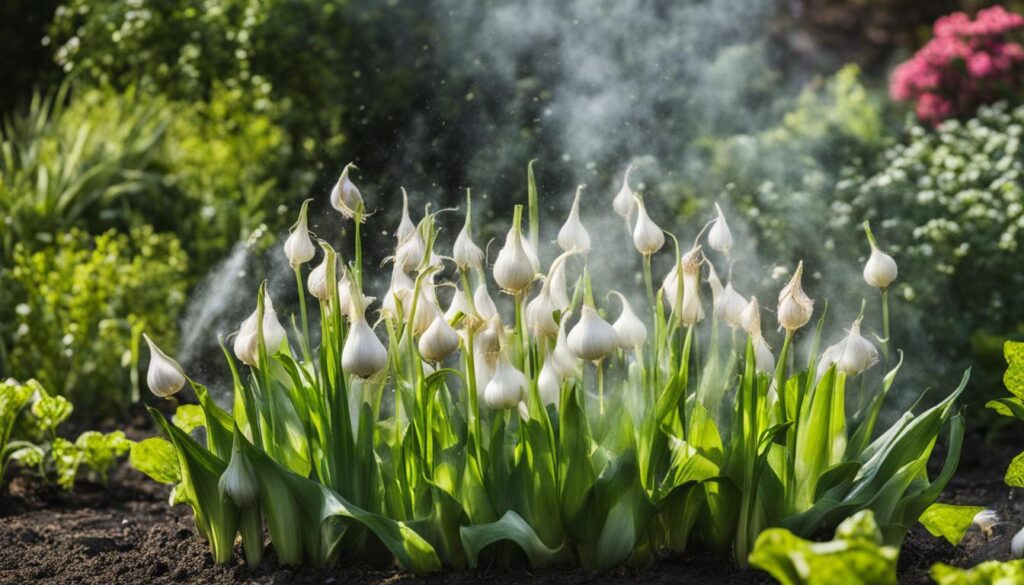Insects can be a nuisance in the garden, causing damage to plants and hindering their growth. If you’re looking for a sustainable solution to keep bugs away, homemade insect sprays can be your go-to option. By using natural ingredients and following eco-friendly practices, you can effectively control garden pests while promoting a healthy and vibrant garden ecosystem.
When it comes to garden pest control, homemade insect sprays have gained popularity due to their effectiveness and accessibility. In this guide, we will explore different types of homemade bug sprays that you can make with ingredients found in your kitchen or garden. From insecticidal soap to neem oil spray, vinegar spray to garlic spray, and tomato leaf spray, we’ll cover a range of options to help you protect your garden naturally.
Key Takeaways:
- Homemade insect sprays are an effective and sustainable solution for garden pest control.
- Using natural ingredients like vegetable oil, garlic, vinegar, neem oil, and tomato leaves can help repel and control a variety of pests.
- Practicing sustainable gardening techniques such as companion planting and promoting biodiversity can prevent pest infestations.
- Always test new bug sprays with a patch test before applying them to your entire garden.
- Avoid spraying bug sprays during hot periods to prevent leaf burn.
Homemade Insecticidal Soap
If you’re looking for an effective and sustainable way to control pests in your garden, homemade insecticidal soap is a great option. Made from common household ingredients, this natural bug spray can help you get rid of aphids, lacebugs, leafhoppers, mealybugs, and thrips without harming beneficial insects or the environment.
To make your own insecticidal soap, you’ll need vegetable oil and mild soap. Dilute one tablespoon of soap and one tablespoon of vegetable oil in a gallon of water. Mix well and transfer the solution to a spray bottle. When spraying affected plants, make sure to cover both sides of the leaves thoroughly. Repeat the application every 7-10 days or as needed.
“Homemade insecticidal soap is a popular choice among gardeners due to its effectiveness and easily accessible ingredients.”
One advantage of using homemade insecticidal soap is that it is safe to use on edibles, so you don’t have to worry about chemical residues. However, it’s always a good idea to test the spray on a small area of your plants to ensure they won’t be damaged. Also, avoid spraying during hot periods to prevent leaf burn.
Neem Oil Bug Spray
When it comes to organic pest control, neem oil is a popular choice among gardeners. This natural insecticide is derived from the seeds of the neem tree (Azadirachta indica) and has been used for centuries to combat a wide range of garden pests. Neem oil contains compounds that disrupt the feeding and reproductive systems of insects, making it an effective and environmentally friendly pest control method.
One of the key benefits of using neem oil is its versatility. It can be used to combat pests such as mites, whiteflies, aphids, thrips, and mealybugs. Additionally, neem oil can also help control powdery mildew, a common fungal disease that affects many types of plants.
To make a neem oil bug spray, simply mix neem oil with water and a few drops of dish soap. The dish soap helps the oil mix with water and improves its effectiveness as a spray. Once the mixture is ready, apply it to the affected plants, making sure to cover both sides of the leaves. Repeat the application every 7-14 days or as needed, especially if you notice a resurgence of pests.
Benefits of Neem Oil Bug Spray:
- Organic insecticide: Neem oil is derived from natural sources and is considered safe for use in organic gardening.
- Effective against a wide range of pests: Neem oil can help control mites, whiteflies, aphids, thrips, and mealybugs.
- Controls powdery mildew: Neem oil has antifungal properties that can help prevent and treat powdery mildew infections.
- Safe for beneficial insects: Unlike some chemical insecticides, neem oil does not harm beneficial insects such as bees, butterflies, and ladybugs.
“Neem oil is a trusted and natural method of pest control that does not harm beneficial insects or pets.”
When using neem oil bug spray, it’s important to follow the instructions on the product label and avoid spraying during hot periods to prevent leaf burn. It’s also a good idea to test the spray on a small portion of the plant before treating the entire plant to ensure there are no adverse reactions.
By incorporating neem oil bug spray into your pest control routine, you can effectively manage garden pests while maintaining a safe and sustainable gardening environment.
Natural Bug Repellent: Vinegar Spray for Garden Pest Control
If you’re looking for a natural and effective way to control garden pests, vinegar spray can be a go-to solution. Vinegar, a common household ingredient, is a powerful natural bug repellent that can help keep your plants healthy and pest-free. Here’s how you can use vinegar spray as part of your garden pest control routine.
Mixing Vinegar Spray
To make vinegar spray, simply mix equal parts of white vinegar and water in a spray bottle. This dilution will provide an effective solution without harming your plants. You can also add a few drops of liquid dish soap to the mixture, which will help the spray stick to the plants and increase its effectiveness.
Applying Vinegar Spray
Once you’ve mixed the vinegar spray, it’s time to apply it to your garden. Spray the mixture directly on the affected plants, targeting areas where pests are commonly found. Be sure to cover both the top and bottom of the leaves. The acetic acid in vinegar disturbs the senses of garden pests, making it an effective repellent.
Tip: Adding essential oils or lemon peels to the vinegar spray can help mask the strong vinegar smell, especially when treating houseplants.
Targeting Ants with Vinegar Spray
In addition to repelling a wide range of garden pests, vinegar spray is particularly effective against ants. Ants rely heavily on scent trails to navigate, and the strong odor of vinegar disrupts their ability to communicate and find food sources. Spray vinegar around entry points, such as windowsills and doorways, to deter ants from entering your home.
Vinegar spray is an affordable and eco-friendly option for garden pest control. It’s important to note that vinegar spray may cause leaf burn if applied during hot periods, so it’s best to avoid spraying on plants during the peak of the day. Always perform a patch test on a small area of the plant before applying vinegar spray to the entire garden.
By incorporating vinegar spray into your garden pest control routine, you can ensure a healthier and pest-free garden while promoting sustainable gardening practices.
Garlic Spray
If you’re looking for a natural insect repellent that is effective and easy to make, garlic spray is the perfect solution. Made by blending garlic bulbs with vegetable oil, mild soap, and water, this spray has been proven to repel aphids, slugs, and carrot fly. Not only does it keep pests away, but it also promotes sustainable gardening practices.
Companion planting is an important aspect of sustainable gardening, and garlic is a great companion plant to have in your garden. By growing garlic alongside other plants, you can create a natural barrier against pests. The strong aroma of garlic acts as a repellent, keeping insects at bay. Plus, growing your own garlic provides a sustainable source for making the garlic spray.
To make garlic spray, simply blend a few garlic bulbs with vegetable oil, mild soap, and water. Allow the mixture to steep for a couple of days, then strain it before using. You can apply the garlic spray directly to your plants as a foliar spray or as a deterrent by spraying it on leaves.
By incorporating garlic spray into your gardening routine and practicing companion planting, you can effectively repel pests and create a healthier, more sustainable garden. Say goodbye to harmful chemicals and embrace the power of natural insect repellents.
Benefits of Garlic Spray:
- Repels aphids, slugs, and carrot fly
- Promotes sustainable gardening practices
- Acts as a natural insect repellent
- Can be made using easily accessible ingredients
- Provides a sustainable source by growing your own garlic
“Garlic spray has been a game-changer for my garden. Not only does it keep pests away, but it also adds a wonderful aroma to the surrounding area. It’s a win-win!” – Gardener123
Tomato Leaf Spray
Looking for a natural and effective way to control aphids and mites in your garden? Look no further than tomato leaf spray! This homemade insecticide harnesses the power of alkaloids found in tomato leaves to repel and eliminate these pesky pests.
To make tomato leaf spray, simply chop up a handful of tomato leaves and steep them in water overnight. The alkaloids will infuse into the water, creating a potent natural insecticide. Strain the mixture and transfer it into a spray bottle for easy application. When applying the spray, make sure to thoroughly coat the foliage of affected plants.
The tomato leaf spray is particularly effective against aphids and mites, which can cause damage to your plants. By using this natural insecticide, you can protect your garden without relying on harmful chemicals. Plus, it’s a sustainable gardening practice that allows you to repurpose tomato leaves that would otherwise go to waste.
Remember, sustainable gardening is all about finding eco-friendly solutions to common problems. Tomato leaf spray is just one example of how you can use natural ingredients to control pests and promote a healthy garden ecosystem. Give it a try and see the difference it can make in your garden!
Conclusion
When it comes to pest control in your garden, natural insecticides provide a sustainable and effective solution. By utilizing ingredients like vegetable oil, vinegar, garlic, neem oil, and tomato leaves, you can create homemade bug sprays that are safer for pets, beneficial insects, and the environment compared to commercial insecticides.
These natural insecticides not only help control pests but also promote sustainable gardening practices. By practicing companion planting and promoting biodiversity in your garden, you can prevent pest infestations and maintain a healthy ecosystem.
Remember to always test new bug sprays and choose the method that works best for your specific pests and plants. Whether it’s using homemade insecticidal soap, neem oil bug spray, vinegar spray, garlic spray, or tomato leaf spray, you have a range of options to explore for effective pest control.
Embrace natural pest control methods and sustainable gardening techniques to protect your garden and promote a healthier environment for all.
Will the Bug Spray for House Plants also work for outdoor gardens?
Yes, an effective bug spray for plants can work for both house plants and outdoor gardens. However, it’s important to read the label and make sure the product is safe for the specific type of plant and outdoor environment. Always consider the potential impact on beneficial insects and the surrounding ecosystem.
FAQ
Can homemade bug sprays cause damage to my plants?
Homemade bug sprays made from ingredients like vinegar, neem oil, and garlic are generally safe for plants when used correctly. However, it’s always a good idea to do a patch test on a small area of your plants before applying the spray to the entire garden. Avoid spraying during hot periods to prevent leaf burn.
Which pests can insecticidal soap effectively treat?
Insecticidal soap made from vegetable oil and mild soap can effectively treat pests like aphids, lacebugs, leafhoppers, mealybugs, and thrips. Dilute the soap mixture with water and spray it on affected plants.
How can neem oil be used to control garden pests?
Neem oil is an organic insecticide that can be used as a spray to treat pests like mites, whiteflies, aphids, thrips, and mealybugs. Mix neem oil with water and dish soap, and spray it on the plants. Neem oil is a trusted and natural method of pest control that does not harm beneficial insects or pets.
Can vinegar be used as a natural bug repellent?
Yes, white vinegar can be used as a bug spray to repel a wide range of garden pests. Mix vinegar with water and dishwashing soap, and apply it to affected areas. The acetic acid in vinegar treats garden pests, and the strong odor repels ants and other scent-driven pests.
How does garlic spray work as an insect repellent?
Garlic spray is a potent insect repellent that can be made by blending garlic bulbs with vegetable oil, mild soap, and water. This spray is effective against aphids, slugs, and carrot fly. It can be used as a foliar spray or as a deterrent when sprayed on leaves.
How can tomato leaves be used as a natural insecticide?
Tomato leaves contain alkaloids that can be used to create a natural spray toxic to aphids and mites. Chop tomato leaves and steep them in water overnight. Strain the mixture and spray it on plant foliage. This homemade spray is an effective way to repurpose tomato leaves and control aphids and mites.
Are these homemade bug sprays safe for pets and beneficial insects?
Yes, using homemade bug sprays made from ingredients like vegetable oil, vinegar, garlic, neem oil, and tomato leaves can be a sustainable and effective way to control pests in your garden. These natural insecticides are safer for pets, beneficial insects, and the environment compared to commercial insecticides.












